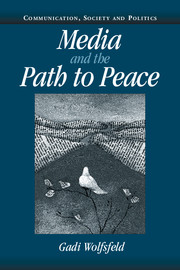Book contents
- Frontmatter
- Contents
- Acknowledgements
- Introduction
- 1 Building theory
- 2 The initial stages of Oslo
- 3 The Israeli media and the debate over Oslo
- 4 The Palestinians and the Israeli media
- 5 The media and the Israel–Jordan peace process
- 6 The media and the struggle for peace in Northern Ireland
- 7 The collapse of Oslo and the return to violence
- Conclusion
- Methodological appendix
- References
- Index
6 - The media and the struggle for peace in Northern Ireland
Published online by Cambridge University Press: 22 September 2009
- Frontmatter
- Contents
- Acknowledgements
- Introduction
- 1 Building theory
- 2 The initial stages of Oslo
- 3 The Israeli media and the debate over Oslo
- 4 The Palestinians and the Israeli media
- 5 The media and the Israel–Jordan peace process
- 6 The media and the struggle for peace in Northern Ireland
- 7 The collapse of Oslo and the return to violence
- Conclusion
- Methodological appendix
- References
- Index
Summary
The time has come to move away from the Middle East to another part of the world. The theoretical principles outlined in the beginning of this work should also explain the role of the news media in other peace processes. Indeed, one of the most important elements of the model attempts to clarify how variations in the political and media environments influence that role. Examining the various stages in the Oslo peace process and the peace process with Jordan demonstrates how changes in the political environment influence the media's behavior. The case of the Northern Ireland peace process provides an even broader perspective. For here one can look at the impact of changes in both the political and the media environments.
The analysis will focus on the period surrounding the Good Friday agreement, which was signed in April of 1998. As noted in the introduction to this work, the interviews were carried out in the spring of 1999. A total of twenty interviews were carried out with political leaders, their advisors, and with a wide range of journalists working in Belfast.
It is helpful to begin by considering some of the similarities and differences between this process and that of Oslo. Similarities include the fact that both conflicts have a long and bloody history and that religious differences play an important part in the ongoing confrontations.
- Type
- Chapter
- Information
- Media and the Path to Peace , pp. 158 - 181Publisher: Cambridge University PressPrint publication year: 2004



